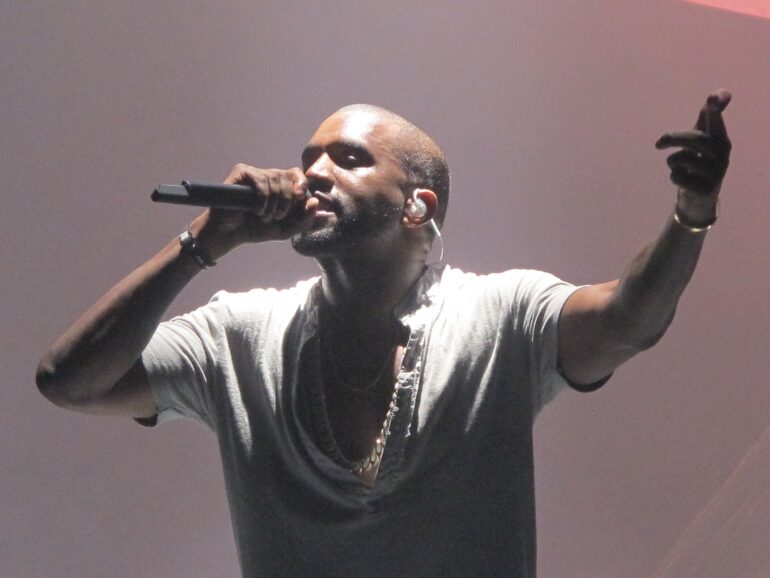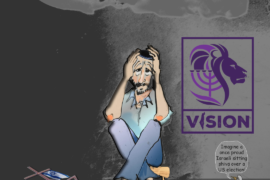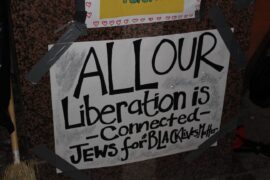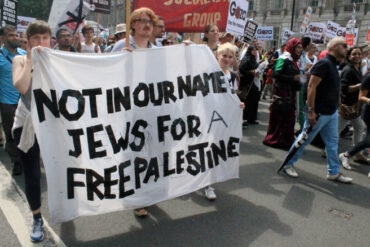Before making the move to Israel, I was quite passionate about raising my voice to point out anti-Semitism and raise awareness. As levels of hatred towards Jews continue to rise, I have noticed more and more people doing the same. At one point in time, this might’ve filled me with hope. But it pains me to admit that instead, I am filled with anxiety.
Online, we discuss the history of hatred towards Jews at length. Like other marginalized groups, we desperately want our identity and experiences of oppression to be acknowledged. We do not miss an opportunity to remind ourselves and others about the horrors of the Holocaust.
After moving to Israel, it became clear to me that despite our loaded history of persecution, Jews as a collective have not yet made sufficient effort to understand how our oppression functions on a systemic level. Much of the online Jewish activism we see appears to be modeled after successful movements for social change. Inspired by the success of other oppressed peoples’ demanding justice, some of us have adopted the language and tactics used by those groups (I myself am guilty of having once shared a blue screen with the appropriated hashtag #jewishlivesmatter).
But the problem is that most of the campaigns Jews have taken inspiration from are most often organized by groups who have done extensive work to identify the mechanisms of how their own oppression operates within a larger system, and to develop methods in efforts to dismantle them. The issue, however, is that our particular placement within that same unjust system cannot be addressed using another group’s frameworks or soundbites. Jewish oppression is unique and we have not yet done the work to create our own framework to understand and communicate our struggle.
Systemic Anti-Semitism
We’ve learned from our history that no gentile system will truly protect or embrace us, and over time we’ve honed tactics that allow us to survive as best as we know how. Usually, this has meant finding a way to integrate into the system through shedding key elements of our identity and utilizing whatever resources we have available to fight for the interests of our people. We have learned to cultivate a relationship with the power structure to allow us to live with some semblance of security. But what we have not realized is this strategy causes us to unwittingly contributes to systemic anti-Semitism.
Other forms of oppression are fairly straightforward – society perpetually holds down certain groups and denies them inclusion. But systemic anti-Semitism is different – Jews are granted conditional acceptance into a power structure and allowed to advance to very visible positions of influence, where we become useful middlemen to the ruling class. When oppressed groups are finally ready to lash out at the system that harms them, the disproportionate inclusion of Jews in that society is designed to present the Jewish people as a perfect scapegoat. To the untrained eye with limited exposure to Jews and our experiences, the system appears to embrace us and protect us. While it’s true that the Jewish story in North America generally began with similar experiences of exclusion and exploitation that other groups have faced and that we fought hard for decades to gain inclusion into mainstream society, what we often have trouble seeing is that the privileged position we attained has been weaponized against us.
While the experiences of other groups have taught them to distrust the power structure, Jews have been conditioned to seek justice through the system. When we feel ourselves (or the State of Israel) attacked, Jews tend to respond with litigation and political lobbying, seeking top-down legislation. When Jewish communities feel vulnerable, we often seek safety through police presence at our institutions and events. Our conditional acceptance in the power structure is actually harmful to how we are perceived by other communities struggling for their rights. Despite living with the trauma of frequent massacres, expulsions, and genocides in several Diaspora countries and the foreboding insecurity of suspecting that history might repeat itself, visibly occupying prominent positions causes those groups pushed to the bottom of society to view us as uber-privileged.
Something else important we’ve learned from our history is that our conditional acceptance is most often temporary – in many of our experiences rising to positions of influence in gentile lands, we’ve at some point or another had our illusions shattered when faced with extreme violence.
Since Jews were enlisted by the nobility as money lenders and tax collectors in medieval Europe, systemic anti-Semitism has functioned in such a way that presents us to the most oppressed groups in Western societies as benefitting from their misfortune. Systemic anti-Semitism is not the only form of Jew hatred that exists but I think it the most important form to focus on in regards to the recent controversy surrounding Kanye West.
The Kanye Controversy
So, how then to address Mr. West’s comments in recent weeks?
Horrifically, what Kanye is spouting speaks deeply to many people. In spite of his overly eccentric persona and general ḥutzpah, he is a beloved cultural icon and therefore influential worldwide. There’s no doubt the impact of his words will be immense.
I don’t know if Jews have considered this, but the impact of how we react to this will be immense too – and there is a lot at stake here. If we’re smart, we will take pause on both an internal and external level to reflect on how to move forward.
So far, most of what I have seen of the conversation has been reactive. I see a lot of hurt, a lot of well meaning affirmations of Jewish strength, and overall, a lot of fear and anger. I can understand this, of course. But I can’t help feeling a pang in my stomach, as it seems we are short on ideas about what exactly we should be doing to help ourselves. People have been encouraging others to “Speak up!” “Have pride!” But what should we say when we speak up? What does it mean to have Jewish pride? And how will it tangibly improve our situation?
There’s a rumor circulating that Kanye made his antisemitic comments as a deliberate ploy to get out of his contract with Adidas. He has apparently been trying to get free for a long time and intentionally picked this fight hoping it would force Adidas out of the deal. Maybe he really hates Jews. Maybe he doesn’t. But if his goal was to provoke Adidas, he is trying to rely on the power and influence that Jews have to get him out of his contract. Regardless of whether there is any substance to the rumor, it speaks to something very deep.
Why? Because Adidas DID drop Kanye after his comments about Jews. If a person believes he planned to get out of his contract by upsetting us… the results would seem to prove him right about the power of the Jewish community, especially seeing as the whole incident occurred right after Adidas failed to bat an eye when the white lives matter debacle upset the black community.
Perhaps Kanye intended to get out of his contract with Adidas by angering the Jewish people, but it remains to be seen if the spiral of damage he faces may prove to be beyond the scope of his predictions. In the long term, even if all the publications, companies, and celebrities denounce him, to the eyes of the public, Kanye will appear to be just another victim of trying to expose Jewish domination.
Trying to cancel Kanye is a huge mistake. If Spotify takes his music down, will it solve anti-Semitism? Probably not. Will it create resentment against Jewish people amongst a lot of Kanye fans? Almost certainly. Already, the internet has begun creating memes exaggerating how extensively Kanye is being canceled. Comment sections are full of fresh accusations against the Jews. Attempting to destroy Kanye’s entire life and career would only be pouring gasoline on the fire. It’s an impossible situation for us. When a celebrity has a contract terminated for being racist, it’s typically met with approval. When it is for anti-Semitism, it perpetuates stereotypes about whiny powerful Jews and further fuels hatred towards us. This is a perfect case study of how anti-Semitism operates.
So What Now?
In an age when society is finally allowing marginalized communities to be heard, the perpetuation of our oppression stings deeply. With our complicated history and placement in the power structure, we do not fit into the current discourse of dismantling oppressive systems nor are we welcomed to join in on the conversation, at least not as our full selves. Most of what we are saying is said within our own echo chambers and what is heard by the world is not understood.
The obvious outcome of this fact of reality is distressing, and it is being avoided. If still we haven’t yet managed to find a way to be truly heard by other people, and sentiments against us are growing, it might only be a matter of time before things descend into violence.
I was raised on a steadfast diet of Holocaust education. As a child, I read Holocaust novels and asked extensive questions about the Nazis who were frequent guest stars in my nightmares. The biggest lesson I took away was this: when society starts to turn against Jews, you leave while you can. When I heard that after Kristelnacht, many Jews of Europe remained, I swore never to allow myself to ignore warning signs. A morbid lesson for a child, but I also grew up thinking after the gas chambers the world could never turn on Jews again. I maintained this belief until I was around 17 and realized how easy it is for everybody else to forget they existed. Jews haven’t forgotten about the gas chambers, but I often wonder how many of us have learned the lessons we needed to learn from them.
What Kanye said is important because it reflects an attitude towards Jews in North America that’s no longer on the fringes. Using the influence of visibly powerful Jews to deplatform or punish Kanye for his words can only backfire as it adds fuel to the fire of how we’re depicted by those wishing us harm. But at the same time, we as a people should also recognize that this entire conversation is a distraction from a much more important story currently playing out in our land.
The only answer I feel whole with so far is that the organized Jewish community should shift focus to the project of rebuilding Hebrew civilization in our land after nearly 2,000 years of exile. We should stop fighting for our place in gentile society and encourage our people to return home and build their lives with our people. There’s no shortage of problems to fix in Israeli society – and all of them should be more important to us than the rantings of Kanye West.





